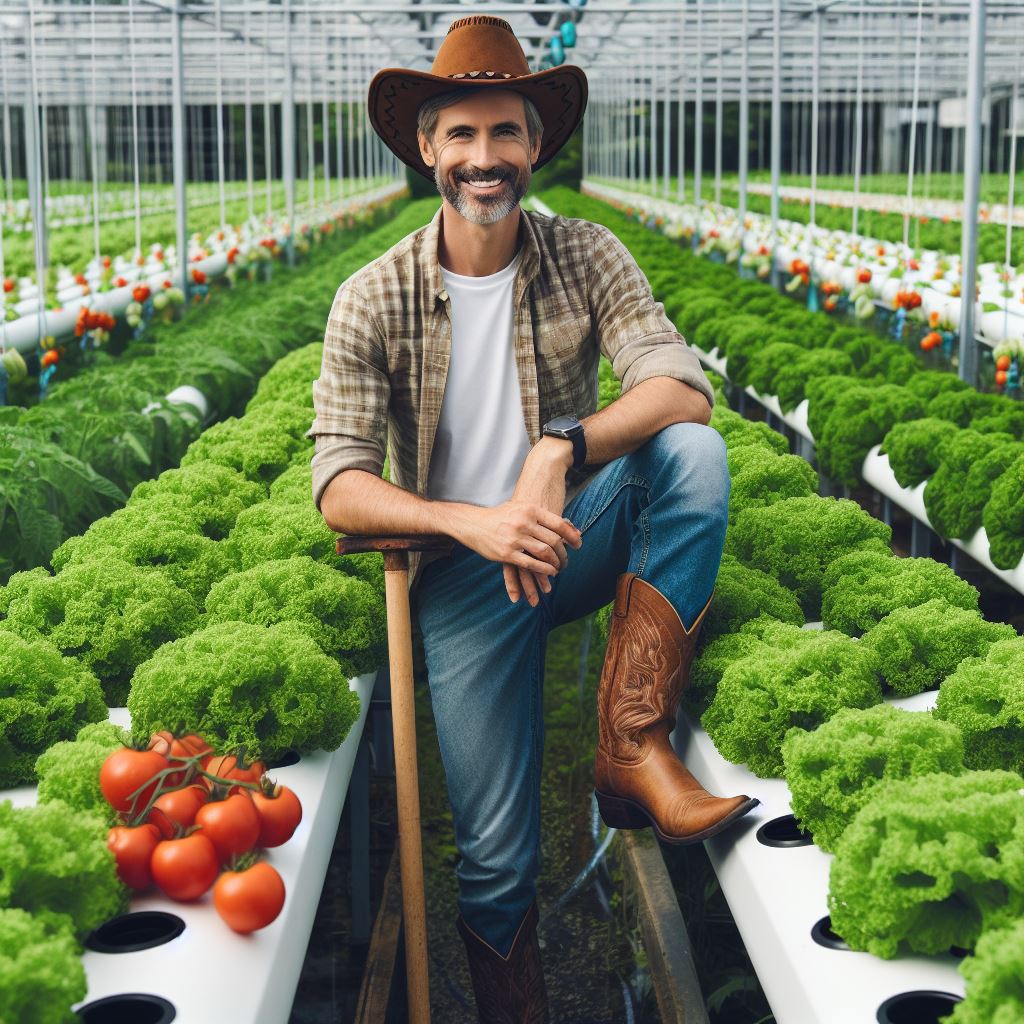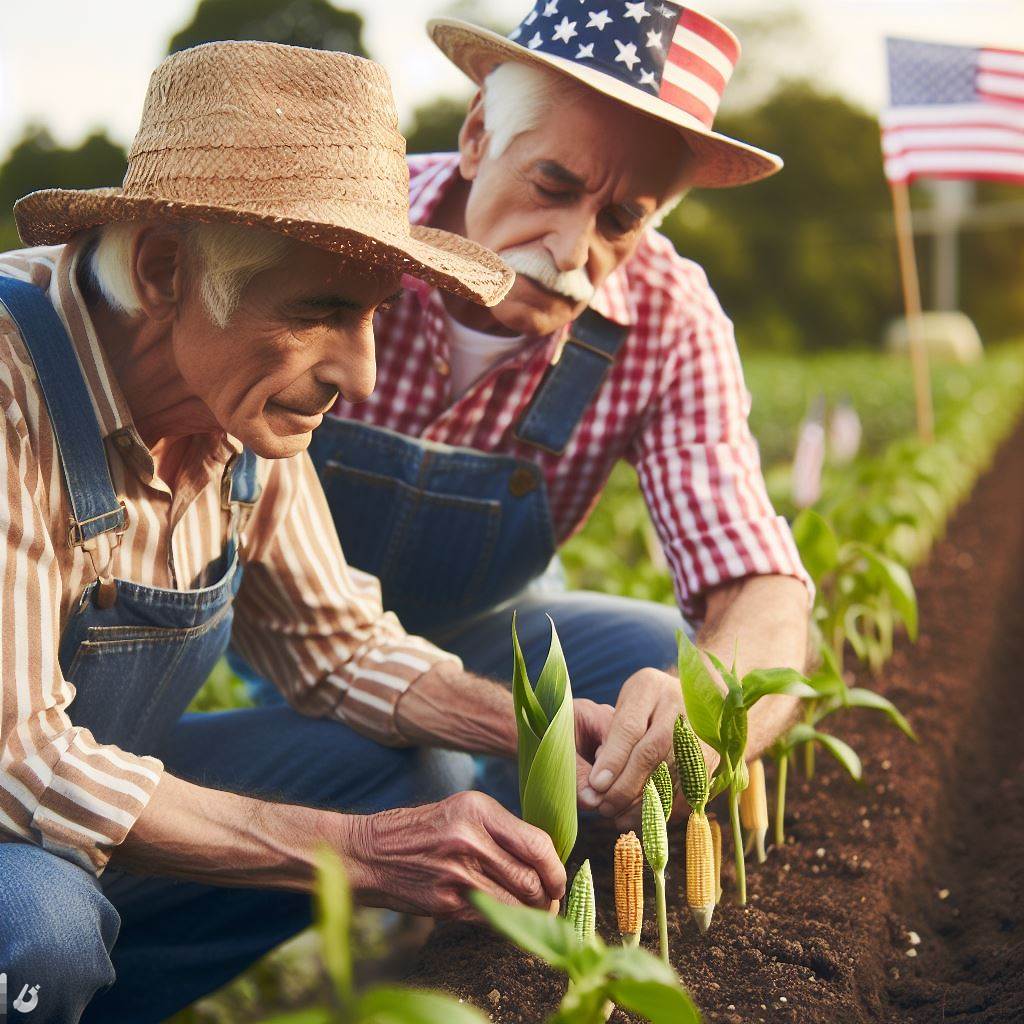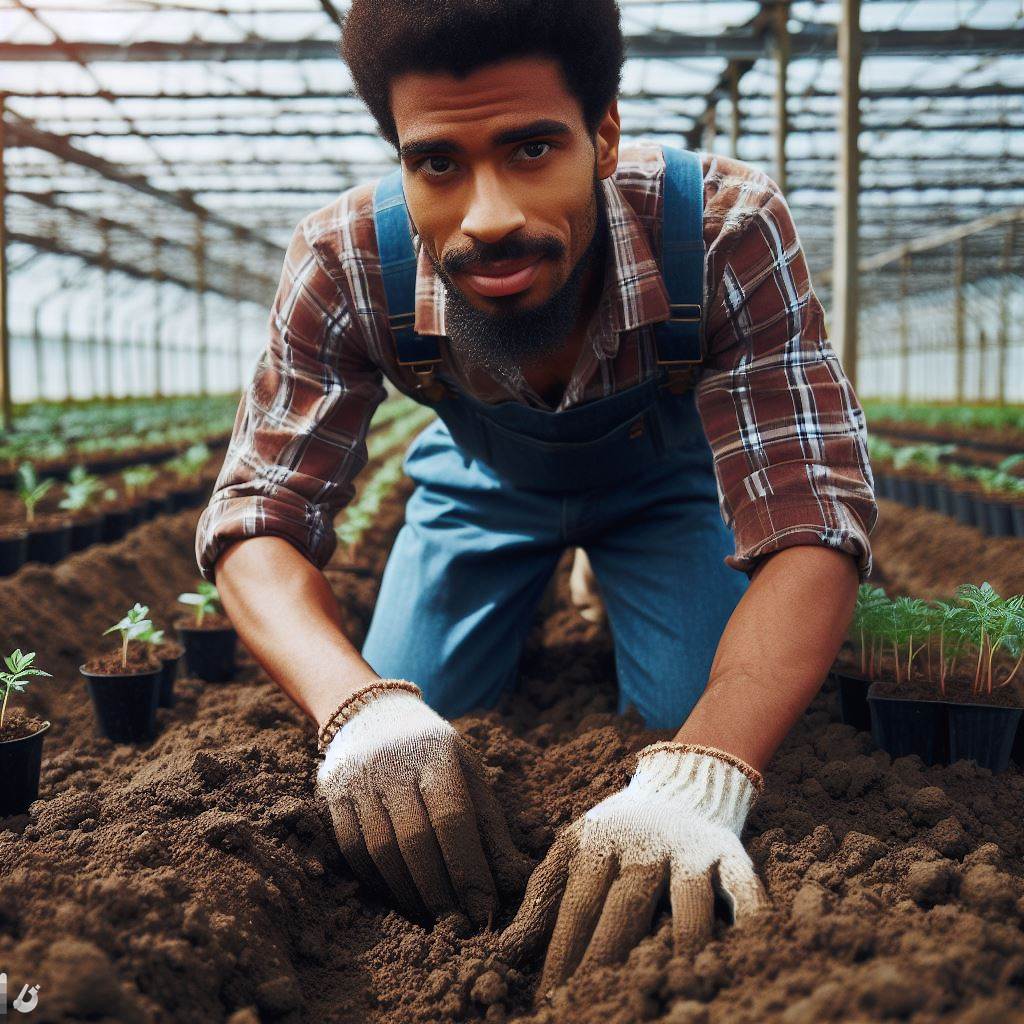Introduction
In this blog post, we explore the advancements in sustainable agriculture technology.
Sustainable ag tech plays a crucial role in modern farming practices to ensure long-term environmental and economic viability.
Importance of sustainable agriculture technology in modern farming practices
The importance of sustainable agriculture technology cannot be overstated.
It allows farmers to maximize crop yields while minimizing their impact on the environment.
This technology helps conserve natural resources, reduce greenhouse gas emissions, and protect biodiversity.
By adopting sustainable ag tech, farmers can optimize resource use through techniques like precision farming and smart irrigation systems.
These technologies enable precise application of fertilizers and pesticides, reducing waste and minimizing the risk of contamination.
Furthermore, sustainable ag tech promotes soil health by using cover crops and implementing conservation tillage practices.
These methods prevent erosion, improve soil structure, and increase organic matter content for long-term sustainability.
The integration of data analytics and machine learning in sustainable ag tech empowers farmers with real-time insights and decision-making support.
Smart sensors and drones assist in monitoring crop health and identifying potential issues before they become widespread.
Sustainable agriculture technology also fosters animal welfare by providing better housing, monitoring systems, and feeding practices.
This ensures the well-being of livestock while optimizing efficiency and reducing waste.
Basically, sustainable ag tech is revolutionizing farming practices. Its importance lies in safeguarding resources, protecting the environment, and ensuring the long-term viability of the agricultural industry.
By embracing these advancements, farmers can achieve greater productivity while minimizing their ecological footprint.
Transform Your Agribusiness
Unlock your farm's potential with expert advice tailored to your needs. Get actionable steps that drive real results.
Get StartedDefinition of Sustainable Agriculture Technology
What sustainable agriculture technology entails
Sustainable agriculture technology refers to innovative solutions that promote environmentally-friendly farming practices while ensuring high yields and efficient resource management.
It involves a wide range of technologies such as precision farming, hydroponics, vertical farming, and aquaponics.
The main goal is to minimize negative environmental impacts, conserve natural resources, and promote long-term sustainability in the agriculture industry.
Its significance in improving efficiency and reducing environmental impact
Increased Efficiency
- Sustainable agriculture technology utilizes advanced tools like drones, robots, and sensor networks.
- These technologies enable farmers to collect real-time data on soil conditions, weather patterns, and crop health.
- With precise information, farmers can optimize fertilization, irrigation, and pest control, leading to higher yields.
- Efficiency gains reduce production costs, making farming more economically viable.
Conservation of Natural Resources
- Sustainable agriculture technology promotes responsible use of resources like water and energy.
- Precision irrigation systems deliver water directly to plant roots, minimizing wastage.
- Efficient energy management systems decrease reliance on fossil fuels, thereby reducing carbon emissions.
- Soil health monitoring and management techniques prevent erosion and preserve soil fertility.
Environmental Impact
- By adopting sustainable agriculture technology, farmers can minimize pollution and chemical use.
- Precision application of fertilizers and pesticides reduces the risk of water contamination and soil degradation.
- Integrated pest management techniques prioritize natural pest control methods, minimizing the need for chemical interventions.
- Sustainable agriculture practices help protect biodiversity and maintain ecosystem balance.
Climate Change Adaptation
- Sustainable agriculture technology equips farmers with tools to adapt to climate change challenges.
- Climate-smart practices like conservation tillage and cover cropping improve soil moisture retention and carbon sequestration.
- Precision farming enables farmers to adjust their practices according to changing weather patterns, reducing crop losses.
- Diversification of crops and introduction of resilient varieties minimize the impact of extreme weather events.
Economic Benefits
- Sustainable agriculture technology can enhance farmers’ profitability and economic resilience.
- High crop yields and reduced input costs improve income generation.
- Access to real-time market information and online platforms connects farmers directly with consumers, eliminating middlemen.
- Efficient resource management lowers production expenses, making farming more economically viable.
Generally, sustainable agriculture technology encompasses various innovative solutions that prioritize environmental conservation and long-term sustainability.
It improves efficiency, reduces environmental impact, and helps farmers adapt to climate change challenges.
By embracing these technologies, the agriculture industry can achieve economic prosperity while safeguarding the planet for future generations.
Read: Hydroponics 101: Basics & Benefits
Current Trends in Sustainable Ag Tech
Precision farming has become an essential aspect of sustainable agriculture for efficient resource management and higher crop yields.
Technological advancements in this area have enabled farmers to monitor their crops in real-time and make data-driven decisions.
Latest developments in precision farming
One significant development in precision farming is the use of drones and satellite imagery for crop monitoring.
Drones equipped with cameras and sensors can capture high-resolution images and collect vital data about plant health, growth patterns, and potential yield estimations.
Satellite imagery helps farmers analyze large areas of land remotely, identifying potential issues such as nutrient deficiencies or pest outbreaks.
Another key development in precision farming is the adoption of sensor technology for soil moisture management.
Soil moisture sensors provide farmers with accurate data about the moisture content in different zones of their fields.
This information enables them to optimize their irrigation practices, preventing water wastage and ensuring that crops receive the right amount of water at the right time.
Advancements in smart irrigation systems
Moving on to smart irrigation systems, the integration of IoT technology has revolutionized water management in agriculture.
IoT devices such as moisture sensors, weather stations, and connected irrigation controllers allow farmers to monitor and control their irrigation systems remotely.
Real-time data on soil moisture, weather conditions, and evapotranspiration rates help farmers make informed decisions regarding irrigation scheduling, reducing water usage and maximizing crop productivity.
Additionally, automated water usage based on crop needs is gaining traction in sustainable agriculture.
By analyzing various factors such as plant growth stage, weather conditions, and soil moisture levels, smart irrigation systems can automatically adjust water delivery.
This ensures that crops receive optimal hydration while minimizing water waste, leading to more sustainable agricultural practices.
The role of robotics and automation in sustainable agriculture
The role of robotics and automation in sustainable agriculture is becoming increasingly prominent.
Autonomous farming vehicles, equipped with GPS, sensors, and AI, can perform tasks such as planting, spraying, and harvesting with higher accuracy and efficiency than traditional methods.
These vehicles reduce the dependence on manual labor and enable precise operations, resulting in improved resource utilization and reduced environmental impact.
Showcase Your Farming Business
Publish your professional farming services profile on our blog for a one-time fee of $200 and reach a dedicated audience of farmers and agribusiness owners.
Publish Your ProfileFurthermore, AI-powered robots are being utilized for selective harvesting and weed control.
Using computer vision and machine learning algorithms, these robots can identify ripe fruits and selectively harvest them, minimizing waste and human labor.
They can also detect and remove weeds, reducing the need for chemical herbicides and promoting sustainable weed management practices.
Essentially, current trends in sustainable ag tech, particularly in precision farming, smart irrigation systems, and robotics, are revolutionizing the way agriculture is practiced.
The use of drones, satellite imagery, sensors, IoT technology, and robotics is enabling farmers to make data-driven decisions, optimize resource usage, and enhance crop productivity while minimizing environmental impacts.
These advancements lay the foundation for a more sustainable and efficient future in agriculture.
Read: Top 5 Trends in Vertical Farming Tech
Impact of Sustainable Ag Tech
Environmental Benefits
One of the most significant advantages of sustainable ag tech lies in its environmental benefits.
By reducing pesticide and fertilizer usage, sustainable agriculture technology minimizes the negative impact on ecosystems and the surrounding environment.
Harmful chemicals can contaminate soil, water, and air, leading to ecological degradation and endangering biodiversity.
The adoption of sustainable ag tech mitigates these risks and promotes a healthier and more sustainable environment.
In addition to minimizing chemical usage, sustainable ag tech also emphasizes the efficient use of water resources.
Through advanced irrigation methods, such as precision irrigation and drip irrigation, farmers can optimize water distribution and minimize wastage.
Water scarcity is a growing concern worldwide, and agriculture is a significant consumer of freshwater resources.
By conserving water through sustainable practices, farmers contribute to overall water resource management and sustainability.
Economic Advantages
Sustainable ag tech offers numerous economic benefits for farmers.
By improving productivity and crop yields, farmers can increase their overall revenue.
Sustainable practices such as organic farming and integrated pest management can lead to healthier plants and higher-quality produce, commanding better prices in the market.
Furthermore, sustainable agriculture minimizes the reliance on external inputs, such as pesticides and fertilizers, reducing the associated costs.
Sustainable ag tech also optimizes labor requirements, leading to cost savings for farmers.
Automation and mechanization in agriculture streamline various tasks, reducing the need for manual labor and increasing efficiency.
This shift allows farmers to allocate resources more effectively and invest saved funds into further technological advancements, reinforcing the economic advantages of sustainable ag tech.
Improved Food Security and Sustainable Food Production
The utilization of sustainable ag tech has the potential to address food security concerns and promote sustainable food production.
By adopting sustainable practices, farmers can enhance the resilience and productivity of their crops.
This increased productivity helps meet the growing global demand for food while minimizing the degradation of natural resources.
Sustainable ag tech enables farmers to produce more food with fewer resources, reducing waste and optimizing production systems.
This, in turn, improves food availability and affordability in both local and global markets, contributing to enhanced food security.
Additionally, sustainable agriculture practices prioritize soil health and biodiversity conservation, ensuring the long-term sustainability of food production systems.
In general, sustainable ag tech brings about significant environmental, economic, and food security benefits.
By reducing chemical usage, conserving water resources, and optimizing farming practices, sustainable agriculture technology fosters a more sustainable and resilient agricultural sector.
Farmers can benefit from increased productivity, cost savings, and improved market competitiveness.
Moreover, sustainable food production ensures the availability of quality food, contributing to global food security.
Read: Soil Health Monitoring: New Tech Trends

Challenges and Limitations of Sustainable Ag Tech
Sustainable agriculture technology offers numerous benefits, but there are also several challenges and limitations that need to be addressed.
Implementing these technologies requires overcoming obstacles and ensuring proper training to maximize their potential impact in the agricultural sector.
Potential obstacles in implementing sustainable agriculture technology
High initial investment costs
The adoption of sustainable ag tech often involves significant upfront costs, including purchasing equipment and implementing infrastructure changes.
While these investments can lead to long-term savings, accessing capital for these initial expenses can be a challenge for farmers, especially smaller-scale operations.
Adoption barriers for farmers facing limited access to technology
Many farmers, particularly those in developing regions or remote areas, may face limited access to the necessary technology.
Lack of internet connectivity, electricity, or technical support can hinder the adoption and effective utilization of sustainable ag tech.
Bridging this digital divide is crucial to ensure widespread implementation.
Showcase Your Farming Business
Publish your professional farming services profile on our blog for a one-time fee of $200 and reach a dedicated audience of farmers and agribusiness owners.
Publish Your ProfileThe need for proper training and education in utilizing ag tech effectively
While sustainable ag tech holds great promise, its successful implementation requires proper training and education.
Farmers and agricultural workers need to understand how to utilize these technologies effectively and integrate them into their existing farming practices.
This includes knowledge of how to operate the equipment, interpret the data gathered, and make informed decisions based on the insights provided by the technology.
Training programs and educational initiatives
Training programs and educational initiatives can play a pivotal role in empowering farmers and agricultural workers to harness the potential of sustainable ag tech.
These programs should focus on providing hands-on training, technical support, and guidance tailored to the specific needs and limitations of the farming community.
Collaboration between technology providers, governmental organizations, and agricultural institutions can help facilitate the dissemination of knowledge and skills.
Moreover, addressing language barriers and ensuring accessibility to training materials in various formats can enhance the effectiveness of these programs.
By empowering farmers with the necessary skills, they can overcome the challenges associated with the implementation of sustainable ag tech and maximize its benefits.
Overcoming Challenges
The limitations and challenges associated with sustainable ag tech should not deter its adoption, as the potential benefits are immense.
However, stakeholders in the agricultural sector must work collectively to address these challenges and ensure the necessary support systems are in place.
Governments can provide financial incentives and subsidies to mitigate the initial investment costs, while private sector organizations and NGOs can play a pivotal role in bridging the technology gap and providing training opportunities.
In essence, sustainable ag tech has the potential to revolutionize the agricultural sector by improving efficiency, reducing resource consumption, and mitigating environmental impacts.
However, addressing challenges such as high initial investment costs, adoption barriers, and the need for proper training is crucial to harness its full potential.
By investing in these areas, we can create a sustainable future for agriculture and ensure food security for generations to come.
Read: Sustainable Farming via Tech Innovations
Gain More Insights: Revolutionary Tech Transforming the Future of Farming
Future Outlook and Innovations
Insights into Future Advancements in Sustainable Ag Tech
- The integration of AI and machine learning is expected to revolutionize predictive analytics in the agricultural industry.
- Developments in biotechnology will lead to enhanced crop traits, such as increased yields and resistance to diseases.
The Potential Role of Blockchain in Ensuring Transparency and Traceability
Blockchain technology has the potential to transform the food supply chain by ensuring transparency and traceability.
In the past, consumers had limited visibility into the origins and journey of their food products.
However, with the use of blockchain, every step of the supply chain can be recorded and verified, providing customers with accurate and trustworthy information.
Benefits of blockchain
Immutable and decentralized ledger
One of the key benefits of blockchain is its ability to create an immutable and decentralized ledger.
Each transaction or movement of a product is recorded in a block, which is then added to a chain of previous blocks.
This ensures that the information cannot be altered or tampered with, providing a transparent and reliable source of data.
With blockchain, consumers can track the journey of their food products from farm to table.
They can verify the authenticity of organic certifications, ensuring that the products they purchase meet their ethical and sustainability standards.
Enables greater traceability in case of food recalls or outbreaks of foodborne illnesses
Moreover, blockchain can enable greater traceability in case of food recalls or outbreaks of foodborne illnesses.
By quickly identifying the source of contamination, authorities can take immediate action to prevent further spread and protect public health.
Blockchain can also improve supply chain efficiencies by reducing paperwork, minimizing the need for intermediaries, and streamlining transactions.
This can lead to cost savings and faster delivery times, benefiting both producers and consumers.
Challenges to address
However, the widespread adoption of blockchain in the agricultural industry is still in its early stages.
There are several challenges that need to be overcome, including the interoperability of different blockchain platforms, the scalability of the technology, and ensuring data privacy.
Nevertheless, many companies and organizations are actively exploring the potential of blockchain in agriculture.
For example, IBM’s Food Trust initiative aims to create a blockchain-based network for supply chain transparency and traceability.
In a nutshell, the integration of AI, machine learning, and biotechnology is set to revolutionize sustainable agriculture by enhancing predictive analytics and crop traits.
Moreover, blockchain technology has the potential to ensure transparency, traceability, and efficiency in the food supply chain.
As advancements continue, the future of sustainable ag tech looks promising.
You Might Also Like: Future Crops: Biotech for Better Yield
Uncover the Details: The Impact of Drones on Crop Monitoring
Conclusion
This blog post has explored various advancements in sustainable agriculture technology that hold promise for the future of farming.
Precision agriculture tools like GPS, sensors, robotics and AI allow for more targeted use of inputs like water, fertilizers and pesticides.
Greenhouse technology and hydroponics optimize growing conditions while reducing environmental impact.
Showcase Your Farming Business
Publish your professional farming services profile on our blog for a one-time fee of $200 and reach a dedicated audience of farmers and agribusiness owners.
Publish Your ProfileGene editing techniques can produce more resilient crops.
Renewable energy systems like solar, wind and biogas provide clean power.
Mobile tech improves access to information and financial services for smallholder farmers.
While promising, these technologies require thoughtful implementation to maximize benefits and mitigate risks.
Embracing sustainable agritech is vital for the future of farming.
Feeding a growing population while conserving resources and adapting to climate change will require high-tech and high-touch solutions.
Technology alone cannot transform agriculture – it must be paired with natural processes, indigenous knowledge and social support networks.
Any agtech advance must consider its total life cycle impact. Progress will depend on collaboration between farmers, scientists, policymakers and consumers.
With informed, inclusive innovation, agriculture can nourish people and the planet for generations to come.
The path forward will not be easy, but with care and creativity, a sustainable future is within reach.




